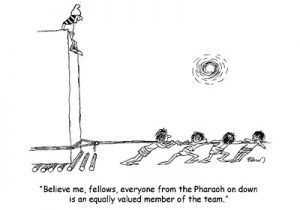One of the key principles of Leadership is Partnership. We define Leadership as “holding the Vision, causing Partnership, and holding people to Account”. Partnership, we believe, is the ‘holding oneself to account for the success of each member of the team’.
What do we Really Mean by ‘Partnership’?
Perhaps you’ve heard the story: There was a man who wanted to see both hell and heaven. He goes first to a land where all the people have delicious food to eat. But they have spoons longer than their arms, so they go hungry and suffer horribly. Then he goes to another place where everyone has the same wonderful food and the same long spoons. But here, they use the spoons to feed each other! This is the nature of hell and heaven, and the hair’s breadth that divides them.
We use this parable, which exists in many cultures, to demonstrate the difference between what people normally call ‘partnership’ and the partnership which could possibly exist in a team or an organisation of people working together. How would it be if you and everyone else in your team came to work committed to ensuring each other’s success?
What Kinds of ‘Normal’ Organisational Behaviour Would You No Longer See?
- You would never fingerpoint (or be fingerpointed at!) over failure to deliver a promise
- You could not be at ease with delivering results and getting recognition, when other members of your team had struggled to achieve their targets
- You would never suffer from anxiety and overload, while other team members were happy, thriving and successful in their work
In a team where the ‘long spoons’ model of partnership exists:
- The whole team takes accountability for everyone’s results – if one team member is struggling to produce results, the whole team feels it has failed
- The leader is a full member of the team, not set apart from other team members in any way, though he has a specific role to fulfil. And it is their job to have him or her succeed, just as it is their job to have team members succeed
- The satisfaction, motivation and well being of other members of the team is just as much a part of your job as is achieving your targets
Why Should You, as a Leader, Create Partnership?
You could argue that, in the presence of a powerful leader, partnership is unnecessary – you will get the job done with or without others’ involvement. But in today’s organisations, this is not sufficient. You might achieve the result, but at what cost? If you don’t involve others, you leave them disempowered and demotivated. You don’t train them in how to produce results. Your organisation is the poorer, and if you leave, your knowledge and skill leaves too.
Then too, many organisations these days are moving to a matrix structure, where it is increasingly difficult for any one person to get the job done without involving others. In fact it’s often positively destructive to focus single-mindedly on your own targets when so many others’ success depends on your cooperation and involvement.
Working in partnership maximises the chances of success for you, and for everyone else in the organisation. Leading the charge on a white charger is a very lonely position to be in, especially when you look round, and there’s nobody behind you!
[callout title=”Develop your partnership skills in your business” button=”Here’s how” link=”/services/organisation-development/” buttoncolor=”white, yellow, orange, red, blue, green, gray, black, alternative-1, alternative-2, alternative-3″ target=”_blank or _self”]Create an impact in your organisation[/callout]
